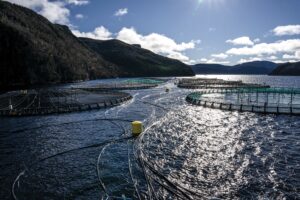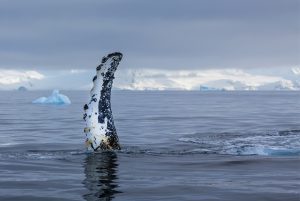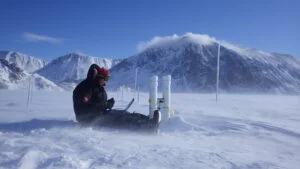
Environment
Farming a changing sea
Struggle and success in Atlantic Canada, where aquaculturists strive to overcome climate change and contamination while chasing a sustainable carbon footprint
- 4058 words
- 17 minutes
People & Culture
Ocean Bridge participant Susana Veliz recounts her experience as an immigrant to Canada while taking part in this Ocean Wise program

In May 2022, 14 Canadian youth aged 18–30 came together in the St. Lawrence region for a 10-day learning journey as part of Ocean Wise’s Ocean Bridge program, where they discovered the region’s marvels while learning from local Indigenous knowledge-keepers and conservation experts. Ocean Bridge aims to empower young people to make an impact on ocean conservation by giving them the tools and confidence to lead educational and service projects in their communities.
As a 12-year-old immigrant to Canada, I was anxious to find environments that resembled what I loved back home in Ecuador. Almost immediately after moving to Toronto for good, my family and I were introduced to Wasaga Beach, Ont., which became a place we enjoyed and interacted outdoors with our newfound Ecuadorian family friends. Our conversations often revolved around how much we missed the charm of the Pacific Ocean and how we could not shake the feeling that Wasaga lacked the magic of the beaches back home. Although Ecuador and other South American countries are blessed with epic landscapes, from the Amazon rainforest to the Andes mountains, I felt that cityscapes were our preferred environment.
During the pandemic, my heart longed to visit the ocean, which had been readily available to me growing up in Ecuador. Moving to a new country comes with its own set of challenges; one of them is yearning for what you can no longer have. I do have to admit that grief lessens but never disappears. With Toronto being so far from the ocean, I have grown to appreciate the lakes surrounding us but had not taken the time to learn about the ocean bordering the country. That said, something in me wanted to know more and discover what else is out there. This was when I discovered Ocean Bridge.

I missed the coastal landscapes of Ecuador and was looking for a program that would allow me to feel connected with nature. I began my search by looking for a part-time volunteer program in Ontario that would allow me to continue with my present work situation. After days of searching and not being able to find the right program, an ad about Ocean Bridge popped up on Facebook. At first, it seemed too good to be true, but after doing a bit more research, I realized it was a match made in heaven. The Ocean Bridge Classic program is a six-month (May – October) part-time program for Canadians and permanent residents aged 18 – 30 from coast to coast. The idea of being able to interact with like-minded individuals, dive into a personal project and get on the field to learn firsthand through the two immersive regional learning journeys seemed like the right fit for me. I also appreciated the hybrid model and the flexibility of the project-based experiential program, making it easier for people to partake in it without putting their other commitments on hold.
As a program ambassador and participant, you will have the opportunity to learn and explore one of Canada’s awe-inspiring regions: The Pacific Coast, the Great Lakes, the St. Lawrence River, and the Atlantic Coast. My experience with Ocean Bridge began in Montreal when 14 other participants from Ontario and Quebec and I were soon introduced to Jen, Sam and Zihan, the St. Lawrence program leaders. When I was told we would explore the St. Lawrence region, I thought we would sail around the area in bathing suits, soaking in the sun, Caribbean style. It was colder than I expected, but I am still amazed at our bodies’ ability to adjust to various outdoor conditions.

The opportunity to connect with other Latin American Canadians during the learning journey was a first for me because I often find myself being the only Latin American or one of only a handful, which made me question how open spaces can be made more accessible. It was also an insightful experience to share my story with fellow individuals raised by Latin American parents or who came to Canada at different stages in their lives. And I was shown how numerous factors depended on exposure to nature, like hiking, backcountry camping, and similar activities.
Discovering the amazing provincial and national parks, open spaces, and outdoor activities have been challenging due to my lack of knowledge of Canada’s landscapes. It can also be overwhelming to navigate, which is why it is so valuable that the Ocean Bridge program can create a safe environment for people to experience nature freely. Seeing other individuals immerse themselves in nature and gain confidence was inspiring. The learning journey was the first time some of us had had the opportunity to go camping, visit First Nations communities, go sailing, discover Québec from a new angle, and immerse ourselves in ocean conservation.

The aspect of the learning journey that deeply touched my heart was being able to connect with those in Essipit and the Innu community in Mashteuiatsh. I truly appreciated their openness in sharing their journeys and Indigenous teachings. At their core, they believe in conserving traditions to honour past generations, creating a sense of community for present generations, and preserving the environment for future generations. However, what resonated with me the most was their practice of taking only the exact resources they needed without disrupting the environment and always approaching it with positive intent. It made me reflect on the connection between humans and nature and what that connection means to me.
I can now confidently say that the learning journey transformed my love for the ocean and my fond childhood memories into something more. Missing what I consider home is normal and part of moving to a new country. Adapting takes time, and we all have different ways of processing things. As I reflect on my experience, I realize that being outdoors and engaging with nature does help me feel connected to the place I now call home. The idea of staying local has become a priority for me, as has the reaffirmation that being different can be a good thing. Belonging does not mean that I forget where I came from, but it allows me to create a way for my past and future to coexist. My relationship with the natural Canadian landscape has evolved over time, becoming the space where I can get lost in my thoughts and be awed by the simplicity of nature.
Susana Veliz is based in the Greater Toronto Area, Canada. Once a self-proclaimed city girl, not long ago, she fell in love with hiking and exploring nearby towns in Ontario. Being in touch with nature has helped her feel more centred and has increased her sense of belonging to the place she now calls home. Susana currently works in education management, where she hopes to be part of the reshaping of the learning and teaching space.
Are you passionate about Canadian geography?
You can support Canadian Geographic in 3 ways:

Environment
Struggle and success in Atlantic Canada, where aquaculturists strive to overcome climate change and contamination while chasing a sustainable carbon footprint

Environment
In February, the 5th International Marine Protected Areas Congress was hosted in Vancouver on Musqueam, Squamish and Tseil-Waututh territory. Here are seven highlights for the seven seas.

Environment
Ten years after the release of her seminal book Sea Sick, Alanna Mitchell again plumbs the depths of the latest research on the health of the world’s oceans — and comes up gasping

Science & Tech
Celebrating Canadian Innovation Week 2023 by spotlighting the people and organizations designing a better future